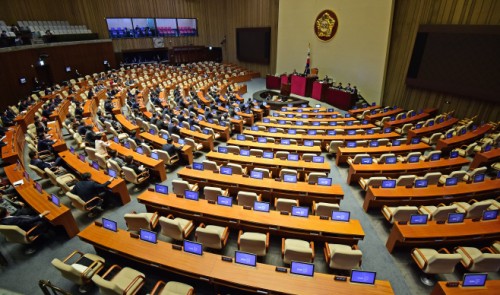 |
| A plenary session of the National Assembly/ Photographed by Song Eui-joo |
By AsiaToday reporter Lim Yoo-jin
The National Assembly on Wednesday passed eight bills related to fine dust, including relaxation of regulations on the use of liquefied petroleum gas (LPG) vehicles.
Parliament held a plenary session and approved eight bills intended to better fight fine dust. In particular, it approved a bill for the partial revision of the Safety Control and Business of Liquefied Petroleum Gas Act, which will allow ordinary consumers to purchase LPG vehicles that are considered to emit less air pollutants than diesel or gasoline-fueled cars.
As the amendment passed the plenary session, LPG will be now one of available fuel options. The use of LPG vehicles was previously limited to taxis, rental cars and vehicles for the disabled. Fuel prices for LPG vehicles are cheaper. Currently, the national average price per liter is 1,350 won for gasoline and 1,250 won for diesel while LPG price is 800 won per liter, cheaper by nearly 40 percent.
The legislation includes a revision to the disaster and safety management law to include high density of particulate matter as a “social disaster.” Such a designation allows the government to use state funds and take extraordinary measures in response.
A bill making it mandatory for schools to install fine dust measuring devices and air purifiers in all of their classrooms was also passed. With the passage, fine dust measuring devices and air purifiers will be installed in kindergartens, elementary, middle and high schools.
The Special Act on the Improvement of Air Quality in Port Areas includes an implementation of joint investigation by the Minister of Oceans and Fisheries and the Minister of Environment on air quality conditions in port areas. By law, they should establish a comprehensive plan necessary for improving air quality in port areas every five years.
The Amendment to the Indoor Air Quality Control Act includes the installation of indoor air quality measure devices in subway stations by March 2021. Under the law, the Minister of Environment shall establish the basic plan for improving air quality, such as fine dust reduction measures, every five years. Nursery schools and indoor amusement facilities for children are subject to application of this Act.
Through the enactment of the Special Act on the Improvement of Air Quality in Air Control Zones, the designation of air control zones will be expanded to highly-polluted areas as well as areas adjacent to them. Within air control zones, the total permissible volume of emission will be controlled for business sites that emit air pollutants and diesel vehicles should install a gas reduction device.
The amendment of the Clean Air Conservation Act defines the types of low-emission automobiles and emission levels. In addition, the matters related to the supply and purchase of low-emission vehicles defined in the Special Act on the Improvement of Air Quality in Seoul Metropolitan Area will be transferred to the Clean Air Conservation Act.
The revision of the Special Act on the Reduction and Management of Fine Dust was also passed. The amendment changed the existing non-mandatory provision of installing and operating a national fine dust information center, which collects and analyzes emission level of fine dust, as a mandatory one.
Most Read
-
1
-
2
-
3
-
4
-
5
-
6
-
7





















